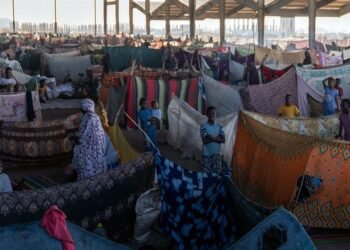The International Criminal Court (ICC) has handed down landmark convictions against two senior figures behind the violence that tore through the Central African Republic (CAR) between 2013 and 2014.
Judges on Thursday found Patrice-Edouard Ngaïssona and Alfred Yekatom guilty of war crimes and crimes against humanity committed during their leadership of the largely Christian anti-Balaka militia, which waged a brutal campaign against the country’s Muslim population.
The court ruled that both men orchestrated and participated in atrocities that included “murder, torture, persecution and forcible transfer” of civilians based on their religious identity. The verdicts were delivered after a nearly four-year trial that involved over 170 witnesses and the review of close to 20,000 pieces of evidence.
Ngaïssona, who once headed the CAR football federation and briefly served as sports minister, was convicted on 28 charges. Yekatom, a former parliamentarian known as “Rambo,” was found guilty of 20 counts. The ICC sentenced Ngaïssona to 12 years in prison, while Yekatom received 15 years.
The judges noted that Ngaïssona had long acted as a political coordinator of the anti-Balaka forces. He was accused of supplying funds and strategic direction to militia groups at the height of the crisis in 2013 and 2014. While he was acquitted of rape charges, he was held accountable for his broader role in leading attacks that resulted in mass killings, displacement, and terror against Muslim civilians.
Yekatom, who commanded around 3,000 fighters, was described by the court as someone who not only led armed units into the capital, Bangui, but also celebrated the atrocities committed by his men. Prosecutors argued that he “authorised his fighters to attack Muslim civilians, including to slit throats, cut off ears and bury people alive.” Although he was cleared of conscripting child soldiers, his overall command role and actions were found to be instrumental in the widespread violence.
Violence That Shook A Nation
CAR was thrust into chaos in 2013 after Muslim Seleka rebels seized control of the government, ousting President François Bozizé. In response, the anti-Balaka movement rose to resist Seleka dominance, unleashing retaliatory attacks that spiraled into sectarian bloodshed. The United Nations and other observers reported that at least 1,000 people were killed in the capital, Bangui, in December 2013 alone, with half the city’s residents fleeing within a single month.
Ngaïssona and Yekatom both denied the charges throughout the trial. Asked to enter pleas at the start of proceedings, each responded by rejecting all allegations. However, the judges found overwhelming evidence of their involvement in orchestrating and sustaining the violence.
According to media reports and witness testimony, the campaign of terror initiated by anti-Balaka groups was not random but rather systematic, targeting Muslims as “enemies of the nation.” Yekatom’s command role on December 5, 2013, when his fighters entered Bangui and committed large-scale atrocities, was a pivotal point in the court’s decision.
Profiles Of Convicted Leaders
Patrice-Edouard Ngaïssona’s reputation as a public figure in sports did not shield him from scrutiny. In 2015, he was barred from contesting the CAR presidency due to his alleged involvement in the violence. Human rights organizations criticized his election to the Confederation of African Football (CAF) executive committee in 2018, raising concerns about impunity. He was arrested by French authorities in December 2018 and transferred to the ICC in January 2019.

Yekatom, despite facing UN sanctions, was elected as a Member of Parliament in 2016. His arrest followed a dramatic incident where he fired a gun during a parliamentary session and fled the chamber. His subsequent extradition marked the first such transfer from CAR to the ICC, a move hailed by the International Federation for Human Rights as a signal that the government was ready to confront impunity.
The ICC continues its investigations into crimes committed in CAR, with proceedings against a Seleka commander currently underway. The court’s latest verdict sends a powerful message about accountability for wartime atrocities and the enduring consequences of sectarian violence.
READ ALSO: Mid-Year Budget Review Raises Key Economic Concerns



















